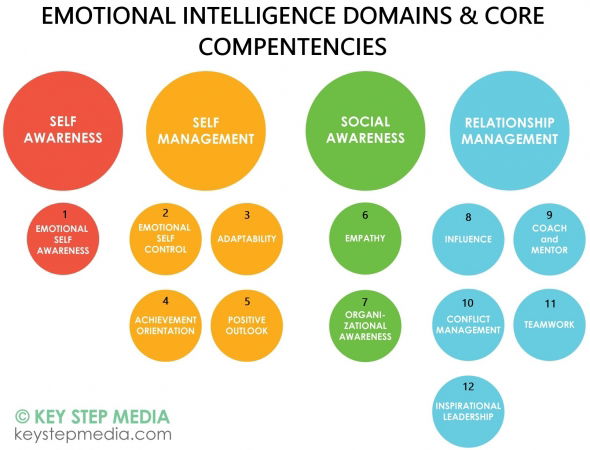share on
Emotional intelligence is a crucial attribute of a good – or even great – leader. This includes the capability to not only monitor their own emotions but also of those around them.
Famously, characters like David Brent (pictured above) from feted TV show The Office would fall into category of someone that thinks they have a high EQ but in fact has a very poor ability to interpret his emotions or those of his team – with hilariously disastrous consequences.
Organisations are increasingly factoring in emotional intelligence when hiring and developing their employees. Research consistently show that the higher EQ someone has, the better their performance.
But the ability to comprehend our own emotions is not something that comes naturally, according to Harvard researcher and psychologist Daniel Goleman. Here are 12 traits of EQ and pointers to help improve your own.
#A. Self-awareness
The ability to tune into your own emotions – enabling you to be aware of what you are feeling and why.
#1 Emotional self-awareness. You understand your own strengths and limitations; you operate from competence and know when to rely on someone else on the team. You also have clarity on your values and sense of purpose, which allows you to be more decisive when setting a course of action.
Developing the skill
A crucial component is to admit to your weaknesses. For example. If you’re struggling with something at work be frank about the skills you need to work on to succeed.
#B. Self-management
The capacity to keep negative emotions and impulses under control. This is an essential skill for leaders, particularly during times of crisis as the team will look to them for reassurance.
#2 Emotional self-control: To stay calm under pressure.
#3 Adaptability: Demonstrated as agility during the challenge of uncertainty.
#4 Achievement orientation: Endeavour to meet – or even exceed – a standard of excellence.
#5 Positive outlook: You see and express the good in people and situations.
Developing the skills
During challenging times do not dwell or panic. Take a deep breath and stay calm.
#C. Social awareness
Ability to grasp and interpret other’s emotions, often through non-verbal signals.
#6 Empathy: Putting yourself in other people’s shoes in a meaningful – rather than tokenistic – way.
#7 Organisational awareness: Ability to comprehend the mood and dynamics in a team or organisation.
Developing the skills
Social awareness requires good listening skills. Do not talk over someone else or try to dominate the agenda.
#D. Relationship management
An interpersonal skill set that enables you to motivate, inspire and work harmoniously with others.
#8 Influence: The ability to engage and mobilize the team and execute the tasks at hand.
#9 Coach and mentor: Instilling the desire for long-term learning by giving feedback and support.
#10 Conflict management: The ability bring running disputes into the open and find solutions that satisfy both parties.
#11 Teamwork: The willingness to ‘muck in’ and participate actively – share responsibility and rewards.
#12 Inspirational leadership: Inspiring the team towards an overall vision.
Developing the skills
Focus on a “what’s the worst that can happen?” approach and position yourself as an agent of positive change. Be willing to take risks and try the unconventional.
Parts of this article were first published on the CNBC website.
share on
Follow us on Telegram and on Instagram @humanresourcesonline for all the latest HR and manpower news from around the region!
Related topics


